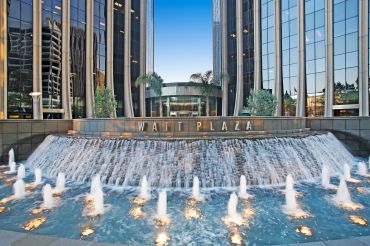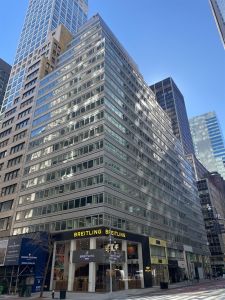Closing Time for Market Line at Essex Crossing
A major New York City food hall shuts down amid lackluster foot traffic
By Aaron Short February 9, 2024 9:54 am
reprints
One of New York City’s most prominent food halls will permanently shut down after failing to lure enough customers to dine on its vendors’ dumplings, soups and burgers, Commercial Observer has learned.
Essex Crossing’s developers are planning to clear out all remaining vendors from the Market Line, a 150,000-square-foot subterranean food court, by early April. The food hall has operated underneath 115 Delancey Street for nearly five years.
Owners blamed the lack of foot traffic at the food hall on the continued effects of the pandemic and said they provided rent abatements and ongoing deferrals to many tenants before deciding to pull the plug.
“In the four years since COVID-19 and its effects on retail and food and beverage tenants, the Market Line and its vendors have continued to struggle. We have decided to close the Market Line with a target date of April 1,” a spokeswoman with Delancey Street Associates, a joint venture of BFC Partners, L+M Development Partners, Taconic Investment Partners and other owners, said in a statement.
Most downstairs tenants have already left.
Veselka, the East Village Ukrainian restaurant, left its stall in January to focus its attention on opening a new outpost in Williamsburg, Brooklyn, Eater reported. Then Nom Wah Tea Parlor, Cafe Grumpy, Pho Grand, Slice Joint, and craft beer bar Grand Delancey ditched the market less than a month later.
The decision to shutter the Market Line will not affect Essex Market, the indoor market whose fish, meat, cheese and produce vendors are managed by the city’s Economic Development Corporation. The closure also will not affect the Regal movie theater or other businesses at the 1.65 million-square-foot complex, owners and city officials said.
“We are saddened to learn about our downstairs neighbor Market Line’s closure, but we look forward to working with the developer on next steps for the space,” NYCEDC spokeswoman Adrien Lesser told CO.
The mood on Delancey Street was far more optimistic five years ago.
City leaders and developers celebrated Essex Market’s relocation from its humble one-story brick home that Mayor Fiorello LaGuardia established in 1940 to a gleaming $1.7 billion glass megadevelopment across the street. In May 2019, Essex Market’s 21 original vendors migrated over to the new space and joined 18 new ones and two restaurants, including Dhamaka which Esquire would name the country’s best new restaurant in 2021. (Dhamaka is not going to be affected by the Market Line closings downstairs.)
Six months later, Essex Crossing launched the Market Line, which featured 30 stalls filled by restaurants that had developed a following among the city’s obsessive food community, including Veselka, Nom Wah, and Taqueria Nixtamal.
The Downtown Manhattan food destination earned ravenous reviews for its mission to showcase the best cuisine New York City had to offer with pride for its immigrant heritage. The New York Times hailed the Essex Crossing development’s layout and design as the anti-Hudson Yards. Owners envisioned filling both levels with a total of 140 vendors at its peak.
But the onset of the pandemic forced the owners to close the space for 16 months. Foot traffic at the Market Line never recovered to pre-pandemic levels, even though nightlife has largely returned to the Lower East Side.
Essex Market and Market Line also kept different hours. Some Essex Market vendors closed as early as 6 p.m. and most Market Line stalls stopped serving food by 8, while the bar and restaurants stayed open later.
New York City Hospitality Alliance Executive Director Andrew Rigie believes the Market Line had trouble reintroducing itself to New Yorkers once restaurants reopened in 2021, and that a food hall was incongruous with the neighborhood’s predominantly late-night audience.
“People traditionally think of food halls as a place to get breakfast and lunch with a limited service experience. You grab your food but you’re not lingering and hanging out,” he said. “Maybe you could have recalibrated it and made it a scene, but that clearly didn’t happen there.”
Essex Crossing’s owners are beginning to hear pitches from brokers about different retail concepts to replace the Market Line, but they have not decided how they will fill the site, sources said.
“We are evaluating uses for the underground space that will be sustainable for the long term,” the Delancey Street Associates spokesperson said.


